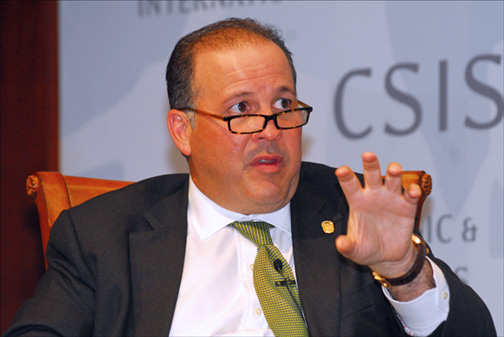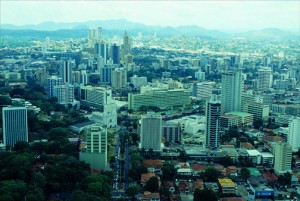Panama’s U.S. ambassador offers upbeat outlook for ’15


Emanuel González-Revilla, Panama’s new ambassador to the United States, makes a case for foreign investment in his country. (Credit: Larry Luxner)
WASHINGTON — Panama, host of the VII Summit of the Americas next April, will see its economy grow faster in 2015 than anywhere else in the Western Hemisphere.
Emanuel González-Revilla, the country’s new envoy to the United States, said Panama’s GDP is likely to expand by 7 percent next year. That’s higher than the 6 percent growth recorded in 2014 — but not as impressive as the 8.5 percent growth of 2013.
In his first public comments since coming to Washington in September, the ambassador praised his own president, Juan Carlos Varela, who took office in July following an election campaign based on four pillars: social inclusion; revitalization of democracy and public institutions; economic development, and national security.
“President Varela is committed to doing away with inequality, and wants to create opportunities for all,” said González-Revilla, speaking Dec. 3 at Washington’s Center for Strategic & International Studies. Carl Meacham, director of the Americas program at CSIS, moderated the panel, which attracted about 35 government officials, business executives, NGO representatives, journalists and diplomats.
Doing away with inequality is a tall order, given the stark contrasts between the skyscrapers and glitz of Panama City and the rest of the country, where poverty is endemic. Although the IMF pegs Panama’s annual per-capita GDP at a respectable $19,411— putting it on par with Uruguay and Turkey — the World Bank says Panama suffers from one of the worst disparities of wealth in Latin America.
Accusations of corruption and mismanagement routinely plagued Varela’s predecessor, Roberto Martinelli, which is why “Varela worked diligently toward the end of his term as Martinelli’s vice president to distance himself from the former president’s most fundamental positions,” according to a policy paper issued in September by the Council on Hemispheric Affairs, a Washington think tank.
This could explain why González-Revilla made a point of contrasting Varela with the four previous heads of state who have been elected since U.S. Marines invaded Panama in 1989, overthrowing then-dictator Gen. Manuel Noriega.
“The president has said many times the government needs to serve the people, not benefit from it,” the ambassador told his CSIS audience. “Corruption will not be tolerated at any level, and will be prosecuted to the full extent of the law. He wants his legacy to be that institutions are not politicized or subject to whoever is in power at the time.”
He added: “We need to make sure there is no favoritism when it comes to doing business in Panama. We want complete transparency in every single government bid, because at the end of the day, corruption has a huge negative economic impact.”
González-Revilla also said Varela wants to make bilingual education a cornerstone of his legacy as president.
“It’s extremely important that our people speak English. We’ve had American bases in Panama for 100 years, so people think everyone in Panama speaks English. But that’s not the case,” he said.

Panama City, which is in the midst of an unprecedented building boom, contains some of Latin America’s tallest skyscrapers. (Credit: Larry Luxner)
Bilingual education a priority
Aiming to have completely bilingual education by 2030, the Varela government has launched a pilot program to send 1,000 teachers to the United States for specialized English-language training. Eventually, 30,000 teachers will participate in the program over the next 15 years. González-Revilla said 14 schools have signed up so far, including American University, Georgetown University and the University of Pennsylvania.
Before becoming ambassador, the bilingual businessman was chairman of Panama Power Holdings Ltd. and Melones Oil Terminal Inc., as well as vice-chairman of Trader Tankers Ltd.
He said he was “thrilled” at Panama’s selection by the Organization of American States as host of the next Summit of the Americas. The event, scheduled for Apr. 10-11, has already generated headlines because it’s the first since the series of OAS hemispheric summit meetings began in 1994 in which Cuba has formally been invited to participate.
“The timing is very interesting,” said González-Revilla. “The region is doing extremely well as a whole, and according to some estimates, by 2020 Latin America will have a $10 trillion economy, with 640 million active consumers.”
Yet Panama’s own Trade Promotion Agreement with the United States, in effect since October 2012, hasn’t done much for Panama’s 3.9 million inhabitants.
“We’re still trying to figure out how to exploit the FTA better. If you look at the numbers, it hasn’t really benefitted Panamanian exports to the United States. It’s more the other way around,” said the ambassador, noting that last year, Panama imported $11 billion worth of goods and services from the U.S., while exports to the U.S. didn’t even total $500 million. “There’s a huge imbalance.”

The Nedlloyd Clement, a Dutch container ship, passes through the Miraflores Locks of the Panama Canal. (Credit: Larry Luxner)
Panama Canal project on front burner
Clearly, he said, the single biggest boost to Panama’s economy will be completion of a $5.3 billion project to widen the 100-year-old Panama Canal. The project, featuring the construction of a third set of locks, will allow the canal to handle post-Panamax ships with a capacity of up to 15,000 containers, instead of the current maximum of 5,000.
But the project has been plagued by delays, strikes and a bitter dispute over $1.6 billion in cost overruns with the consortium of companies carrying out the upgrade. It’s now expected to be finished by early 2016.
“With the expanded canal, we’ll be able to handle 92 percent of the world’s ships. Today’s trading routes will change once the project is finished, and that’s going to have an impact not only in Panama but here too,” he said, adding that the Panama Canal’s added capacity will bring more revenues for infrastructure projects.
“There will be increased investments in ports and logistics projects, power generation and renewable energy,” said the ambassador. “With all this growth, there will be huge demand for hotel rooms, so the hospitality industry will grow too.



